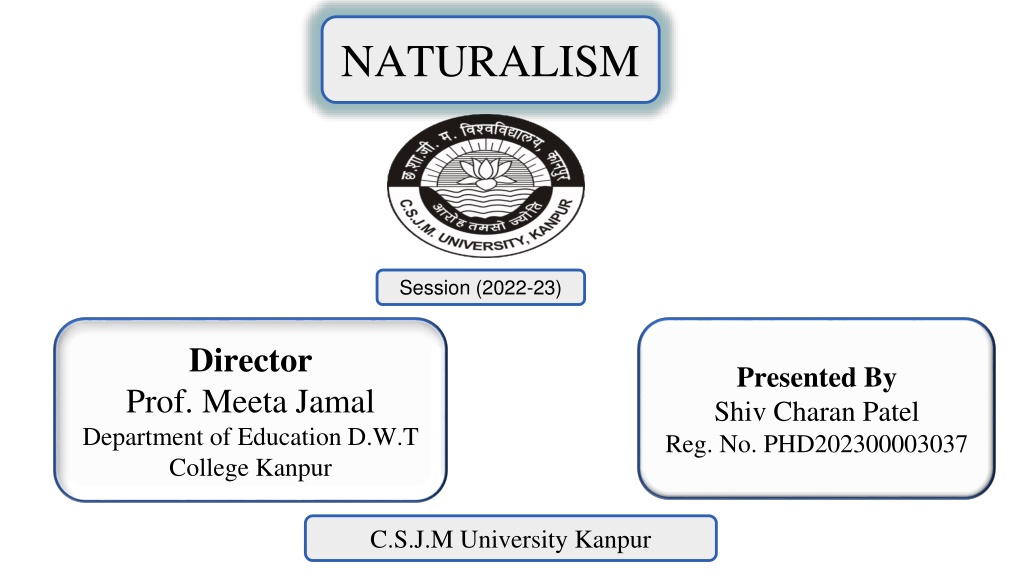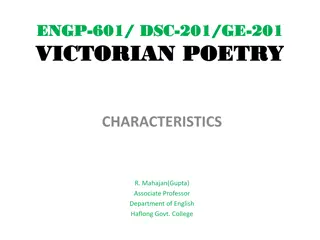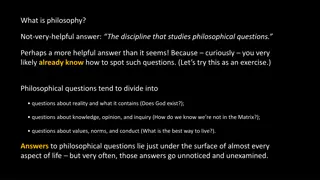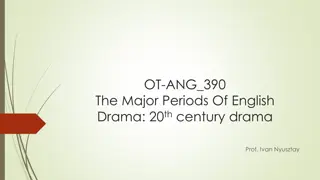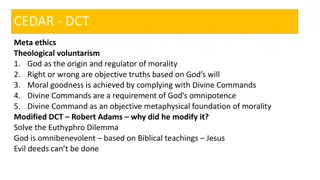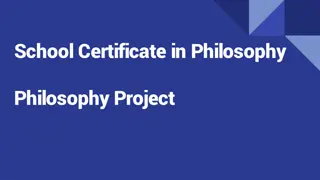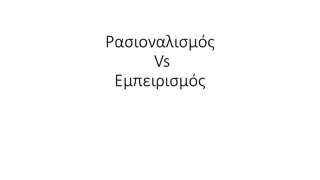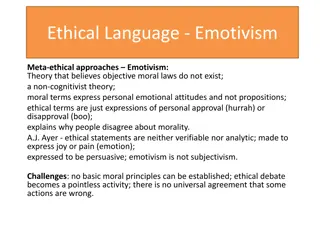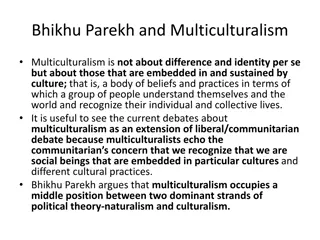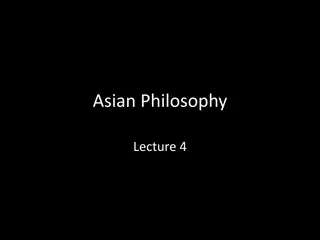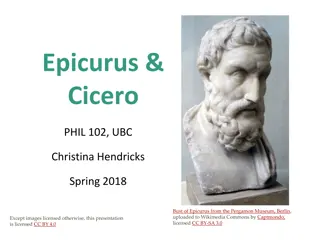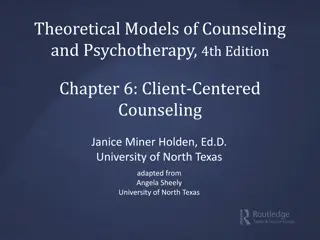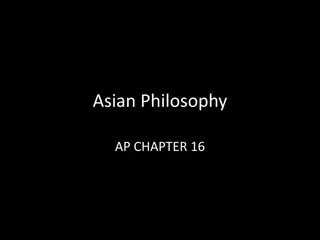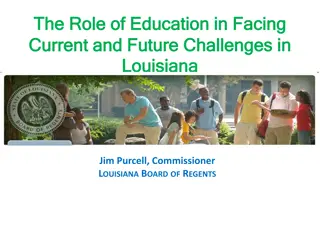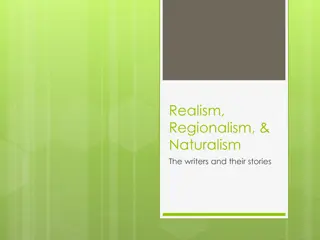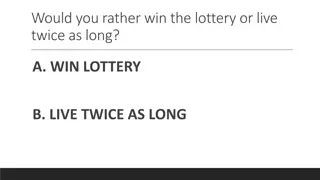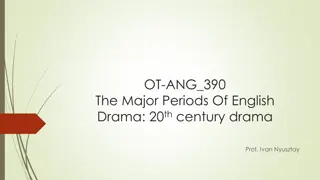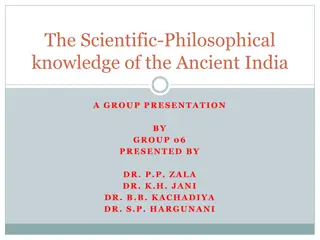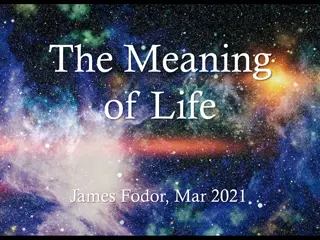Understanding Naturalism in Education: Philosophical Perspectives and Applications
Explore the foundational principles of Naturalism in education, emphasizing the importance of aligning educational practices with a child's inherent nature and the natural world. Delve into the characteristics, proponents, and implications of Naturalism, shedding light on its impact on curriculum development, teaching methods, and school discipline.
Download Presentation

Please find below an Image/Link to download the presentation.
The content on the website is provided AS IS for your information and personal use only. It may not be sold, licensed, or shared on other websites without obtaining consent from the author. Download presentation by click this link. If you encounter any issues during the download, it is possible that the publisher has removed the file from their server.
E N D
Presentation Transcript
NATURALISM Session (2022-23) Director Presented By Shiv Charan Patel Reg. No. PHD202300003037 Prof. Meeta Jamal Department of Education D.W.T College Kanpur C.S.J.M University Kanpur
School of Philosophy Naturalism
Contents Contents INTRODUCTION DEFINITION OF NATURALISM PROTAGONIST OF NATURALISM NATURALISM IN EDUCATION FORMS OF NATURALISM CHARACTERISTICS OF NATURALISTIC EDUCATION NATURALISM AND AIMS NATURALISM AND CURRICULUM NATURALISM AND METHODS OF TEACHING NATURALISM AND TEACHER NATURALISM AND DISCIPLINE NATURALISM AND SCHOOL DEMERITS OF NATURALISM MERITS OF NATURALISM
Introduction Introduction Nature is everything , there is nothing beyond it. Nature is also termed as materialism. Man should investigate the truth of nature by scientific methods with all his capacities and resourcefulness. It doesn't believe in sentimentalism, spiritualism and supernaturalism. It emphasis on the nature in every field of education. It gave importance to the matter and physical world.
Definition of Naturalism Definition of Naturalism 1. Naturalism is a loosely applied in educational theory to systems of training that are not dependent on schools and books but on the manipulation of the actual life of the educated. . .By J.S.ROSS 2. Naturalism is not science but an assertion about science , more specifically it is the assertion that scientific Knowledge is final , leaving no Room for extra scientific or philosophical knowledge. ................................................................................B y R.B.PERRY 3. Naturalism is metaphysics which cosiders nature as the whole of reality . It excludes what is supernatural or the other world. ......................................................... . ..By Hocking
Protagonist of Naturalism Protagonist of Naturalism Aristotle Comte Hobbes Bacon Darwin Lamarck Huxley Herbert Spencer Bernard Shaw Samual Butler Rousseau Rabindranath Tagore
Naturalism In Education In the field of education , naturalism means the development of the child according to his inherent nature. According to Naturalism, the external laws of nature should co-operate with the internal nature of the child for his full natural development. Naturalism In Education
Forms of Naturalism Forms of Naturalism Physical :- It explains human activities and experiences in terms of material objects and natural laws.It lays more stress on the external material phenomena than the conscious man. Physical naturalism with great stress on physical science has not got much importance. Mechanical:- According to it this universe is a huge lifeless machine which gets its form through matter and motion . Man is considered as a mere part of this huge machine which is set in motion through a external stimuli and forces of nature.Has given rise to modern psychology of behaviourism importance of conditioned responses. Biological:- Based upon Darwin theory of education uphold that heredity has a powerful influence on the nature and temperament of an individual being.Biological naturalism emphasizes the development of man s natural impulses, natural propensities and inborn tendencies.
Characteristics Of Naturalism Education 1. Back to Nature 2. Opposition to bookish Nature 3. Progressive 4. Negative Education 5. Central position of the Child 6. Freedom of the Child 7. Emphasis on the training of senses Characteristics Of Naturalism Education
Back To Nature nature, every where they degenerate in the hands of the nature. Opposition to Bookish Nature importance to words. We produce by chattering education , education chatters only.If you are all the time teaching morals only to the child you will make him a fool . If your mind is always giving instructions to the child , then his mind will become useless. Whatever the child learns in the play ground is four times more useful than what he learns in the classroom. Progressive the order , we shall produce fruits without ripeness and flavours.- ROUSSEAU Negative Education idleness far from it. It does not give the virtue but protects from vice - versa. It does not inculcate truth , it protects from error. It disposes the child to take the path that will lead him to truth when he has reached it, and goodness, when he has acquired the faculty of recognizing and loving it. Back To Nature : : - - All the things are good as they come from the hands of the author of the Opposition to Bookish Nature: :- -According to ROUSSEAU We give too much Progressive: :- -Nature wills that children should be children before they are men.If we seek to pervert Negative Education; ;- - According to J.S.ROSS A negative Education does not mean a time of
Central Position Of the Child According to ROUSSEAU Give me a 12 years old boy who does not know anything . By 15years of age, I will teach him so much as other children read in 15 years of early life . The only difference will be that your student remembers only Knowledge and my student will be able to use it in practical life. Freedom Of the Child God makes all thing good , man meddles with them and they become evil. - ROUSSEAU Emphasis On the Training Of Senses Senses are the gateways of the Knowledge. For effective learning adequate sensory experiences should be provided to the child.Education should prepare the way for reason by the Proper exercises of senses. Central Position Of the Child: :- - Freedom Of the Child: :- - Emphasis On the Training Of Senses: :- -
Naturalism And Aims Naturalism And Aims To perfect the human machine Attainment of presents and future happiness Preparation for struggle of life Adaption to environment Improve of racial gains Natural development Autonomous Development
Naturalism And Curriculum Naturalism And Curriculum Naturalists regard religious education as useless. According to them curriculum should consist of subjects and items which reflect the inborn tendencies and natural interests, natural activities , individual differences and sex problems of children so that they develop their individually naturally and normally . As such curriculum should contain , games,sports , physical , culture , biology , physics , nature study , language , history , geography and other allied subjects . Herbert Spencer a staunch Naturalist advocates complete living aim of education and to achieve this aim , curriculum should contain physiology , biology , physical culture , chemistry , arithmetic , home - science and other scientific subjects as main subjects whereas language , literature , art , and other cultural subjects as subsidiary subjects.
Naturalism And Methods Of Teaching Naturalism And Methods Of Teaching In the field of Methodology , naturalism has made very significance contribution. In the traditional system of education , the same type of education was imparted to a group of individuals at a time . Naturalistic education opposed this traditional system and advocated the system of developing inherent tendencies by providing conducive experiences and the children inbibing knowledge by their own efforts , observations and experimentation. 1. 2. 3. 4. 5. 6. Learning by doing. Learning by experiences. Learning by play as the bases of teaching. Book reading is unpsychological. Observation , Play-way Method , Heuristic Method. Dalton plan , Montessori Methods & Other Constructive activities. To engage in activities & experiences which are joyful & 7.
Naturalism And Teacher Naturalism And Teacher ROUSSEAU thought the child as pure inherently. His natural development takes place only when he is allowed to develop freely without any hindrance interference from outside . Naturalists do not like that children should be tight in class by teachers who are spoiled by the artificial atmosphere of society . To them, Nature is the only supreme teacher , in whose close contact the child develops normally and naturally . In the process of education , the place of child is more important and central than the teacher . The teacher should not impose upon the child any thing under his own authority or supremacy . The teacher should so sympathetically and affectionately behave towards the child that he feels full freedom to develop himself according to his natural qualities , interests and capacities . The teacher is only to set the stage and allow the child to act freely according to his inherent capacities and the teacher is only to act as a sympathetic observer and guide.
Naturalism And Discipline Naturalism And Discipline In the field of discipline also, Naturalists depend upon nature and consequences. According to them nature will punish the child if he contravens the law of nature and thus he will learn by the consequences as of his own actions. Thus, no body should interfere in this process of Nature. HERBERT SPENCER Opines - WHEN A CHILD FALLS OR RUN ITS HEAD AGAINST THE TABLE , IT SUFFERS A PAIN, THE REMEMBERENCE OF WHICH TENDS TO MAKE IT MORE CAREFULL, AND BY REFLECTION OF SUCH EXPERIENCES, IT IS EVENTUALLY DISCIPLINED INTO PROPER GUIDENCE OF ITS MOVEMENTS.
Naturalism And School According to Naturalists , school environment should be completely free , flexible and without any rigidity . There should not be any fixed time table and no forcing from above the readymade dozes of knowledge into the minds of children. Nature will do all the planning and processing for the natural Development of children . Nature itself structures all the free and desired experiences and also develops feeling of self- learning and self- discipline . The TAGORES VISHWA BHARTI is model of such free school where children are given Free full freedom to plan their own interests and natural tendencies . These creative and self creative activities go to develop the character and personality of the individual through self- discipline and freedom to experiment. All modern and progressive schools adopt this concept of self - discipline to promote self - Development. Naturalism And School
Merits And Demerits Of Naturalism Merits And Demerits Of Naturalism Demerits Merits One - sided and unsatisfying aims of education. Emphasis on present needs. Ignores books. Undue emphasis on physical education. More importance to scientific subjects in curriculum. Unlimited freedom of child . No importance to teacher. Anti - social. Unappealing principle of Discipline by Development of Child psychology. Scientific study of society and sociology. Emphasis on experience - Centred Curriculum. Important contribution in the field of methods of teaching. Opposition to repression in the field of discipline.
Conclusion Conclusion To sum up , it is regarded as the outstanding philosophy of education , as it gives important place to the child in the entire educative process by providing freedom for his natural development. It is rightly said to be harbinger of progressive education. Naturalism is naturo- centric. According to this philosophy only material universe or nature alone is real.
References Gaur, A.K. (n.d). Education Philosophy. 1stEd. Alok Prakashan. 61-73. Lal, R.B. (2018). Philosophical and Sociological Foundations of Education. R. Lal Book Depo. 170-182. Odh, L.K. (2009). Philosophical Perspective of Education. Rajasthan Hindi Granth Academy. 19-33. Saxena, N.R. S. (2002). Philosophical and Sociological Foundations of Education. R. Lal Book Depo. 207-219.
